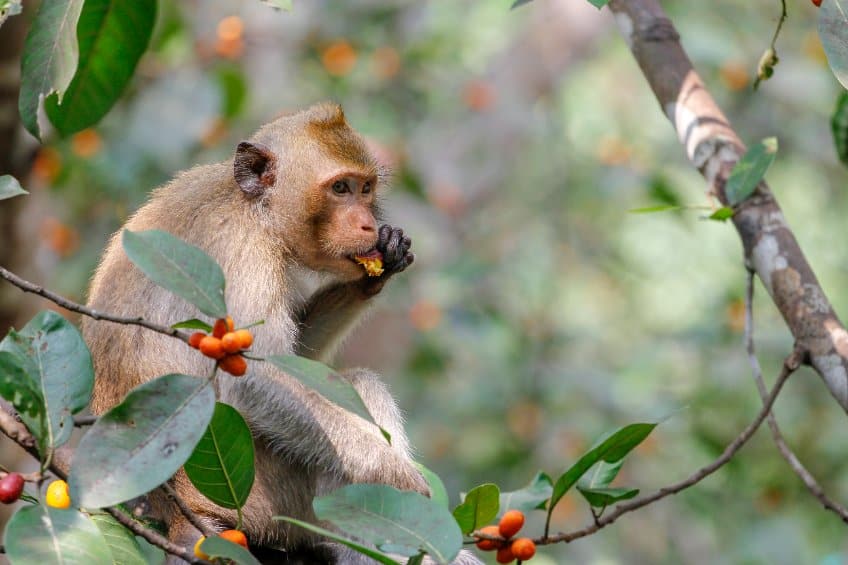By John Salak —
The “drunken monkey” theory may be more than just speculation, providing beer, wine and liquor lovers with scientific support for why they enjoy imbibing.
The cheery chimp concept was first raised by University of California biologist Robert Dudley, who had spent decades investigating why people are attracted to alcohol. Dudley’s 2014 book speculated that ape and monkey ancestors discovered that the scent of alcohol led them to ripe, fermenting and nutritious fruit. This attraction, Dudley theorized, was then passed on to humans.
This theory recently got some scientific backing from primatologist Christina Campbell of California State University, Northridge (CSUN) after her team collected the eaten and discarded fruit by black-handed spider monkeys in Panama.
They discovered that the alcohol concentration in the fruit averaged one to two percent by volume, which is a natural fermentation. The CSUN team’s examination didn’t stop with the fruit. The group also analyzed urine from the monkeys and found it contained secondary metabolites of alcohol, which means these primates were actually using the alcohol for energy.
“For the first time, we have been able to show, without a shadow of a doubt, that wild primates, with no human interference, consume fruit-containing ethanol,” Campbell reported. “This is just one study, and more needs to be done, but it looks like there may be some truth to that ‘drunken monkey’ hypothesis—that the proclivity of humans to consume alcohol stems from a deep-rooted affinity for frugivorous (fruit-eating) primates for naturally-occurring ethanol within ripe fruit.”
The new research takes Dudley’s earlier work much further. While he was able to show that some fruit eaten by primates had an alcohol content of up to 7 percent, he was not able to prove the monkeys or apes preferred fermented fruits or that they digested its alcohol.
For the newly reported study, the CSUN researchers teamed up with Dudley and University of California-Berkeley research assistant Aleksey Maro to analyze the alcohol content in the fruits.
“It (the study) is a direct test of the drunken monkey hypothesis,” said Dudley, UC Berkeley professor of integrative biology. “Part one, there is ethanol in the food they’re eating, and they’re eating a lot of fruit. Then, part two, they’re actually metabolizing alcohol — secondary metabolites, ethyl glucuronide and ethyl sulfate are coming out in the urine. What we don’t know is how much of it they’re eating and what the effects are behaviorally and physiologically. But it’s confirmatory.”
“The monkeys were likely eating the fruit with ethanol for the calories,” Campbell added “They would get more calories from fermented fruit than they would from unfermented fruit. The higher calories mean more energy.”
Whether primates from any period get buzzed from juiced fruits the way humans respond to alcohol is another question. Dudley thinks they probably don’t.
“They’re probably not getting drunk, because their guts are filling before they reach inebriating levels,” he said. “But it is providing some physiological benefit. Maybe, also, there’s an anti-microbial benefit within the food that they’re consuming, or the activity of the yeast and the microbes may be predigesting the fruit. You can’t rule that out.”
It is also unlikely that people can blame their ancestral attraction to alcohol for any excessive drinking problems. While it is possible, maybe now even likely, that humans were drawn to alcohol thanks to primates’ interest in fermented fruit, alcohol issues are the result of other factors.
Monkeys, nonetheless, may help combat the alcohol-related issues in humans. The University of California-Berkley recently discovered that a hormone produced in the liver helped reduce ethanol consumption in Vervet monkeys by 50 percent. This may be significant for humans as these monkeys are highly attracted to fermented fruit.













